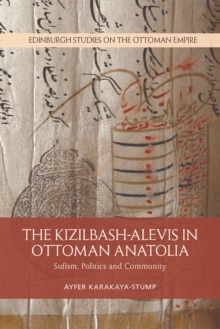
The Kurdish Nobility in the Ottoman Empire : Loyalty, Autonomy and Privilege Hardback
by Nilay zok-G ndo?an
Part of the Edinburgh Studies on the Ottoman Empire series
Hardback
Description
Studies the making and unmaking of the Ottoman Empire's Kurdish nobilityChallenges a long-standing spatial-geographical bias in Ottoman-Middle East history by bringing Kurdish and Armenian histories back into the Ottoman imperial framework Presents the first study to use the framework of hereditary nobility to examine Kurdish elite formation and its decline in the Ottoman EmpireDemonstrates the complex social, economic and political background to massacres and pogroms that targeted the Armenian population of Palu before the Armenian GenocideProvides a much-needed bottom-up historical perspective to Kurdish and Armenian historiographies Uses an array of sources that includes Ottoman, British and American archival documents and interviews conducted with the Palu beys' descendants This book narrates the rise and fall of Kurdish nobility in the Ottoman Empire from the sixteenth through to the nineteenth century.
Focusing on one noble Kurdish family based in the emirate of Palu, a fortressed town in the eastern provinces of the Ottoman Empire, it provides the first systematic analysis of the hereditary nobility in Kurdistan. The book centres on the crucial moment in the 1840s during which the Ottoman state set out to abolish the hereditary privileges of the Kurdish beys, confiscating their large landholdings and setting the stage for a conflict over the fertile lands of Palu that would last nearly six decades.
This tug-of-war between Armenian financiers, Armenian and Muslim sharecroppers, the Kurdish beys and the Ottoman state ended in 1895 with a series of massacres against the Armenian population of Palu.
Through exhaustive archival research in an untapped body of sources, this book sheds light on the impact this conflict-filled process had on the intercommunal relations in the locality.
In doing so, the author brings the voices of Armenian and Kurdish commoners to the fore and highlights the important roles that they, too, played in the local struggles and wider changes in governance. As the first study to present the dissolution of the Kurdish nobility using a social history lens, the book gets to the heart of the historical transformations that changed Palu from a diverse and economically affluent town into an ethnoreligiously homogenised, culturally conservative and economically deprived place.
Peppered with vignettes and stories culled from a wide range of archival sources, the author presents a cohesive narrative of the region's socio-economic and political history between 1720 and 1895, situating developments taking place in the small province of Palu within the larger developments in the Ottoman Empire and the world at large.
Information
-
Only a few left - usually despatched within 24 hours
- Format:Hardback
- Pages:368 pages, 3 B/W illustrations 5 B/W tables 10 black and white illustrations
- Publisher:Edinburgh University Press
- Publication Date:13/12/2022
- Category:
- ISBN:9781399508612
£90.00
£73.45
Information
-
Only a few left - usually despatched within 24 hours
- Format:Hardback
- Pages:368 pages, 3 B/W illustrations 5 B/W tables 10 black and white illustrations
- Publisher:Edinburgh University Press
- Publication Date:13/12/2022
- Category:
- ISBN:9781399508612










